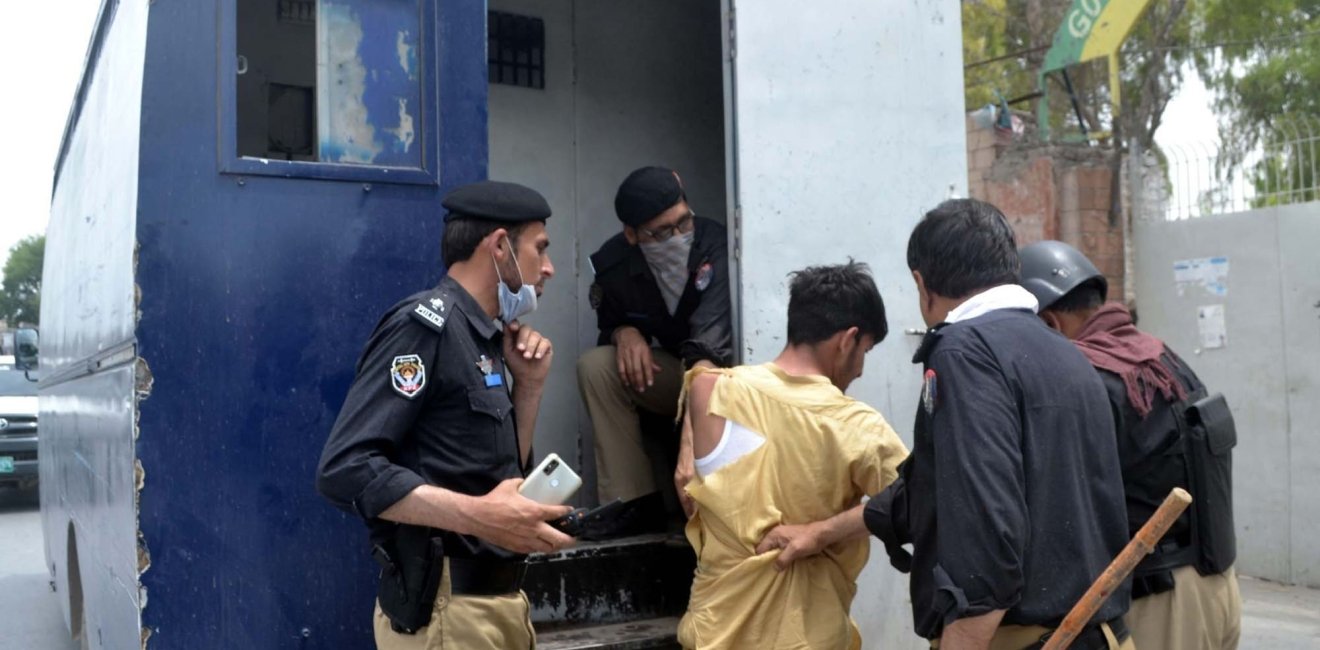
A blog of the Indo-Pacific Program
The decision by Pakistan Army to try civilians accused of involvement in the May 9 riots under military laws has ignited concerns among human rights activists, raising questions about the protection of fundamental rights and civil liberties in the country.
During an address to officers in Lahore Garrison on May 20, Army Chief Gen. Asim Munir announced that the “legal process of trial against planners, instigators, abettors and perpetrators involved in 9 May tragedy has commenced under Pakistan Army Act and Official Secret Act.”
This decision was initially made by the Army's top brass on May 15, following widespread protests triggered by the arrest of former Prime Minister Imran Khan on corruption charges. It was subsequently endorsed by the federal cabinet and the National Security Committee.
Human Rights Watch has reported that approximately 4,000 persons, primarily affiliated with Khan's Pakistan Tehrik-e-Insaf party, have been arrested in connection with the protests. However, the military has not clarified how many of these individuals will be subjected to ‘court-martial’ under the Army Act and Official Secrets Act.
The primary concern lies in the fact that military trials lack the necessary safeguards and transparency, thereby exposing defendants to the risk of potential miscarriages of justice.
The Pakistan Army Act, established in 1952, serves as the legal framework for the trial of military personnel according to Army’s own legal code. Meanwhile, the Official Secrets Act, a remnant of the colonial era, is employed to deal with cases of unauthorized disclosure of information and espionage.
The primary concern lies in the fact that military trials lack the necessary safeguards and transparency, thereby exposing defendants to the risk of potential miscarriages of justice. In view of the history of coerced confessions, denial of due process, and unfair trials, the move to subject civilians to military regulations and procedures would undermine the fundamental principles of justice.
Serving justice through a fair and transparent legal process would serve Pakistan’s own interest by maintaining the integrity of its legal system, protecting the civil liberties and fundamental rights of its citizens, and increasing public confidence in the State.
Can Civilians Be Tried Under Military Laws?
The question of whether civilians can be tried under military laws has been widely debated. Originally, the Army Act was intended to prosecute military personnel only who were accused of specific crimes, not even retired soldiers. However, Section 2(1)(d) of the law expands its scope to encompass anyone who "seduces or attempts to seduce any person subject to this Act from his duty or allegiance to government" and has committed an "offense under the Official Secrets Act 1932."
The ambit of the Army Act was further broadened through an amendment in 2015-16, which included individuals claiming or known to belong to "any terrorist group or organization using the name of religion or a sect" and engaging in attacks on civilians or military institutions, establishments, or personnel. Such cases were referred to military courts based on recommendations from the federal government. It is important to note that this provision did not apply to any political party registered under the Political Parties Act 2002. Furthermore, this provision has ceased to exist after the expiration of the mandate of military courts established for prosecuting those accused of terrorism.
Therefore, technically speaking, there is a very limited scope for the trial of civilians under military laws. The addition of charges under the Official Secrets Act against the alleged rioters is primarily an attempt by the Army to establish jurisdiction, although it would require considerable ingenuity on the part of the prosecutors to justify how these acts of vandalism fall within the purview of this anti-espionage law.
Fairness Of Military Trials: Issues of Transparency and Procedural Concerns
Apart from the question of jurisdiction, another significant concern regarding court-martialing civilians is the fairness of these trials.
There is a lack of transparency surrounding the procedures established for court-martials, with the rules governing them outlined in the secretive Pakistan Army Rules 1954, which have been declared "confidential" by the Army.
"The accused who are undergoing trial are not aware of these rules that explain the process. They are not informed about their rights and obligations. Consequently, they rely on what they are told," explained Omer Farouk Adam, a senior lawyer experienced in dealing with military courts and court-martials.
Pakistan's superior judiciary has on various occasions demanded access to these rules in various military-related cases, but the defense ministry has been reluctant to share them. According to Adam, who has reviewed the rules, they provide substantial, detailed, and exhaustive explanations of how trials are conducted within the military system. However, issues arise with their implementation, and the lack of knowledge about these rules exacerbates the situation.
While the rules of evidence are the same as those followed by civilian courts, Adam pointed out that in many cases he has defended, it was difficult to ascertain the charges against his client, and access to the evidence presented against the accused was also severely limited, making it challenging to prepare a defense.
Much of the evidence in these cases consists of confessions obtained under duress after prolonged confinement, despite the Army rules requiring that confessions be voluntary and free of fear. Adam questioned the voluntariness of confessions made after “50-day confinement.”
No written judgment is provided at the end of the trial, and convictions and sentencing are verbally communicated to the accused.
Furthermore, the officers presiding over court-martials often lack the necessary expertise to interpret the law and assess the evidence according to legal standards required for convicting someone. No written judgment is provided at the end of the trial, and convictions and sentencing are verbally communicated to the accused. The basis of the verdict is never disclosed.
In the appellate process, an appeal can be filed within 14 days of sentencing, which will be heard by an officer of the rank of a two-star general. Delays in hearing appeals are common, with some cases remaining unheard for as long as a year and a half, as noted by Adam.
Decisions in appeals are very brief, stating whether they are "accepted" or "rejected," without elaborating on the grounds for reaching that conclusion. The case then reaches finality with confirmation by the army chief.
Convicts can seek a judicial review in the high courts under Article 199 of Pakistan’s Constitution, which pertains to the jurisdiction of the High Court. However, there is a constitutional limitation on this jurisdiction. Article 199(3) states that "an order shall not be made under clause (1) on application made by or in relation to a person who is a member of the Armed Forces of Pakistan." This limitation is based on the presumption of the correctness of military proceedings and has often been exploited.
Consequently, the high courts have through verdicts and judicial interpretations created a narrow space for hearing appeals in such cases by examining issues related to the jurisdiction of the tribunals, the competence or mala-fide conduct of the judge, and evidence. Matters can later be escalated to the Supreme Court on similar grounds.
The fairness of military trials is, therefore, a matter of significant concern, given the lack of transparency, procedural issues, limited access to evidence, and difficulties in mounting a defense. Upholding the principles of justice, due process, and the protection of civil liberties remains essential to ensure fair and impartial trials.
Potential Conflict of Interest
It is crucial to recognize that one cannot simultaneously act as the plaintiff, prosecutor, and judge in a single case. Such a situation would compromise the integrity of the legal process and raise doubts about the impartiality and fairness of the final judgment.
The weaknesses in the military's judicial system notwithstanding, it is important to acknowledge that the Army is the aggrieved party in the May 9 incident, with its premises and symbols being vandalized. The corps commanders, who convened to discuss the situation, were informed that the desecration and vandalism were aimed at tarnishing the institution.
In this regard, General Munir, while addressing officers in Peshawar Garrison, pledged reprisals for the “the sanctity and security of its (military) installations.” The Army has designated May 9 as a "Black Day" to symbolize the severity of the incident.
Therefore, to ensure impartiality, it is imperative that the Army refrains from assuming the role of judge in these cases. Instead, it should allow the federal government to prosecute the rioters through the civilian courts. The desire for speedy trials, lack of trust in the judicial system, and the need to convey a message of a strong response should not be used as reasons to deny individuals their fundamental rights of due process and fair trial.
Constitutional Rights & International Commitments
The decision by the Army to conduct trials of civilians under the Army Act, backed by ratifications from the National Security Committee and federal cabinet, not only violates the country's Constitution but also contradicts its international obligations.
Article 10-A of the Pakistan Constitution guarantees individuals the right to a fair trial and due process in the determination of their civil rights, obligations, or any criminal charges against them.
Furthermore, Pakistan is a signatory to the Universal Declaration of Human Rights and various international treaties on human rights, including the International Covenant on Civil and Political Rights. Article 14 of this Covenant stipulates that all individuals should be treated equally before courts and tribunals, and everyone is entitled to a fair and public hearing by a competent, independent, and impartial tribunal established by law.
Conducting trials of civilians under military laws would, therefore, undermine the constitutional guarantee of protecting the fundamental rights of citizens. It would also raise concerns globally about the country's disregard for its commitment to uphold human rights and the rule of law.
The implications of these commitments are significant, as they can erode public trust in the justice system, undermine the protection of individual rights, and damage the country's international reputation. It is essential for Pakistan to uphold its constitutional and international obligations to ensure a just and fair legal process for all its citizens.
Baqir Sajjad is the Wilson Center’s Pakistan Fellow. You can follow him on Twitter @baqirsajjad.
The views expressed are the author's alone, and do not represent the views of the U.S. Government or the Wilson Center. Copyright 2023, Asia Program. All rights reserved.
Author

Diplomatic and National Security Correspondent, Dawn Newspaper

Indo-Pacific Program
The Indo-Pacific Program promotes policy debate and intellectual discussions on US interests in the Asia-Pacific as well as political, economic, security, and social issues relating to the world’s most populous and economically dynamic region. Read more





